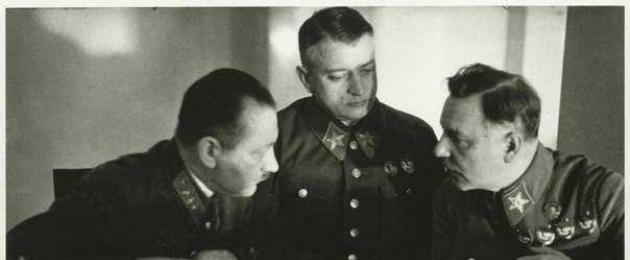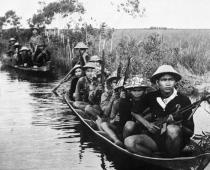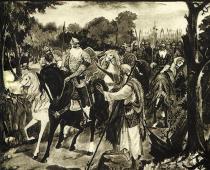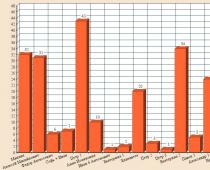Marshal of the USSR and commander of the Red Army, Mikhail Tukhachevsky was an outstanding tactician of his time and went down in history thanks to the theories of military affairs developed by him and books about the war. Among other things, Tukhachevsky is famous for being one of the first victims of the Great Purge, and his death heralded a new era for Soviet Russia.
Childhood and youth
Tukhachevsky was born on February 16, 1893 in the Smolensk region, into a family of noble birth. After graduating from a military school, in 1914, Mikhail Nikolaevich entered the service of the Semyonov Guards Regiment.
When the First World War began, Tukhachevsky set out to become a general before he reached the age of 30.
In 1915, Tukhachevsky was taken prisoner by the German army and tried to escape. Four unsuccessful attempts to escape led him to imprisonment in Ingolstadt - a prison for recidivist fugitives. A fifth attempt to escape was successful and he was able to return to Russia in October 1917.
After the revolution, he was accepted into the ranks of the Workers 'and Peasants' Red Army, turning a blind eye to his noble origin.
Years of the Civil War
Mikhail Nikolaevich became an officer in the Red Army and, thanks to his outstanding abilities, received a quick promotion through the ranks. During the Civil War, he was put in charge of the defense of Moscow. Commander-in-Chief Lev Trotsky assigned Tukhachevsky command of the 5th Army in 1919, in which position he led the campaign to recapture Simbirsk from Kolchak's White Guards. There he used the tactics of capturing the enemy in a ring and concentrated attacks. The campaign was successful.
Also, Mikhail Nikolaevich carried out the final operations to capture General Anton Denikin in the Crimea, in 1920. The success of the Simbirsk campaign allowed the 5th army under his command to take control of the territory of the Volga and the Caspian, thanks to which it was possible to carry out a successful offensive against the Kuban. Using cavalry in this battle, Tukhachevsky finally defeated the rear of the enemy and carried out a hasty evacuation of Novorossiysk.
At the end of the Civil War, Tukhachevsky led the 7th Army during the operation to suppress the Kronstadt rebellion. In addition, he commanded the attack on the Tambov Republic between 1921 and 1922. During this operation, gas attacks were carried out.
War with Poland
During the Soviet-Polish war, under his leadership, the Soviet army invaded Poland in 1920. Tukhachevsky's army lost to the army of Jozef Pilsudski. Polish soldiers victoriously demonstrated the Soviet flags they had captured. During this period, a conflict arose between Stalin and Tukhachevsky. One blamed the other for the defeat of the Soviet Union.
The theory of warfare
Tukhachevsky played a leading role in the development of a new way of warfare - the theory of deep operations. This theory involved striking deep behind enemy formations with the aim of destroying the rear and cutting off the enemy's escape route.
The fleeting war had many opponents in the Red Army, but, nevertheless, it was adopted in the mid-thirties. The theory was included in the code of rules of the Red Army in 1929, and by 1936 it was completely finalized.  One of the main examples of its effectiveness can be considered the victory of the USSR over Japan in the battle of Nomonhan. In this battle, the Soviet army under the leadership of Zhukov defeated the superior enemy force in the early autumn of 1939.
One of the main examples of its effectiveness can be considered the victory of the USSR over Japan in the battle of Nomonhan. In this battle, the Soviet army under the leadership of Zhukov defeated the superior enemy force in the early autumn of 1939.
The theory of fleeting war is constantly being refined and used to this day. It became the basis for many modern forms of combat operations, and it was developed by Tukhachevsky. Due to the large-scale cleansings carried out in the Red Army in the late 30s, this theory was not applied for some time. It was later used again during the Winter War (1939-1940) when the Soviets invaded Finland. It was also used in the key battles for the USSR near Stalingrad and in Belarus.
Personal life
The first wife of Mikhail Tukhachevsky was the daughter of the Penza railway worker Maria Ignatieva. They met at a ball in the gymnasium. The novel that broke out has stood the test of time: the future "red marshal" graduated from the cadet corps, went through the fronts of the First World War, and fought in the civil war. Mikhail Tukhachevsky arrived in Penza, where Masha was waiting for him, as an army commander. Like his father, Mikhail married a girl without noble origin.
The wife went through the roads of the civil war with her husband, supporting Mikhail in difficult moments and enduring hardships. Her mistake was to support relatives in the famine years. Masha, knowing that no one would dare to stop the wife of a high commander, took food to her relatives in Penza. 
When ill-wishers reported the "unworthy behavior" of Tukhachevsky's wife to the Revolutionary Military Council, the ambitious Mikhail Nikolaevich suggested that Maria get a divorce. The woman committed suicide. The 27-year-old widower did not come to his wife's funeral, entrusting the organizational issues to the adjutant.
The commander met his second love in 1920, in the fall. After the failed Soviet-Polish operation, Tukhachevsky needed support. He received it from the niece of the forester, in whose house near Smolensk he frequented. 16-year-old Lika (Lydia) was of noble origin. In the winter of 1921, Mikhail Tukhachevsky offered the girl a hand and a heart. The forester uncle insisted that the young people get married in the church. The red commander agreed, and the secret wedding took place. 
Entering the church, the newlyweds saw an omen - a coffin with the dead. A year later, the pregnant wife announced that she was returning to her family. Lika found out about her husband's mistress, Tatyana Chernolusskaya. Mikhail did not want to part with his wife, but the woman did not forgive the betrayal. She got married shortly after the divorce. The born daughter Irina died of diphtheria in infancy.
The marshal met his third wife in Smolensk. The beautiful noblewoman Nina Grinevich turned out to be an educated woman. In marriage, a daughter, Svetlana, was born. But the family life of the Tukhachevskys was not impeccable: the marshal started an affair with his colleague's wife, Yulia Kuzmina. He also named his illegitimate daughter Svetlana.
Origin of suspicion
Gradually, Stalin came to the conclusion that Tukhachevsky was his most sworn enemy. He gave him the nickname "Napoleon", believing that Mikhail Nikolaevich, together with Trotsky, planned to overthrow the leader. After the redistribution of power in 1929, Stalin began to receive denunciations from servicemen who did not approve of Tukhachevsky's tactics. Then, in 1930, the OGPU forced two officers to testify that Tukhachevsky was involved in a conspiracy against the Politburo and was planning a coup d'état. However, this year the trial of Tukhachevsky did not take place. Stalin received the results of the check on his case, which did not reveal anything.
After that, Mikhail Nikolayevich wrote a number of books on the conduct of the war. In 1931, Stalin began to industrialize the army, and Tukhachevsky was given a key role in its reform. He introduced advanced ideas about the possibilities of tactical use of air and ground equipment in combined attack methods.
Tukhachevsky had a great love for art. He became a close friend and patron of Dmitri Shostakovich. The general's acquaintance with the composer took place in 1925. Subsequently, they often played music together at Tukhachevsky's house (he played the violin well). In 1934, Shostakovich was attacked and condemned after the publication of a critical article in the newspaper Pravda about his work Lady Macbeth. Tukhachevsky stood up for his comrade before Stalin. The arrest of Mikhail Nikolaevich led to pressure on Shostakovich. They wanted to get him to testify against Tukhachevsky. Shostakovich was saved from persecution by the fact that the investigator was also soon arrested.
Arrest of Mikhail Tukhachevsky
In 1935, at the age of forty-two, Tukhachevsky was appointed Marshal of the USSR. Stalin wanted to achieve complete control over the army, seeing in it the only force capable of resisting him. Since their relationship with Tukhachevsky was always difficult, Stalin decided to eliminate the marshal and his seven commanders. This plan did not arouse condemnation among the close associates of the leader.
Tukhachevsky was relieved of his post, having been appointed military commander in the Volga District. On May 22, 1937, he was arrested and taken to the capital in a "funnel".
Interrogation with predilection
Directly under the supervision of Nikolai Yezhov (General Commissar of State Security), an interrogation was carried out. Yezhov ordered his men to do "everything necessary" to get Tukhachevsky to confess. Yezhov was sure that Tukhachevsky had accomplices, and demanded that he immediately extradite them.
It took several days for Tukhachevsky to be broken and confess that in 1928 he was recruited by Yenukidze (then a member of the presidium of the Central Executive Committee of the All-Union Communist Party of Belarus, later secretary of the Central Executive Committee of the USSR). He told that he was a German agent and was in cahoots with Bukharin to carry out a coup d'état and seize power. Tukhachevsky's confession is still kept in the archive, it is all covered with brown spots.
Judgment and execution
On June 11, 1937, a special tribunal was convened by the Supreme Court of the Union of Soviet Socialist Republics to sentence Tukhachevsky and other officers convicted in the case for treason. The process was called: "The case of the military."
On the same night at 23:35 all the defendants in the case were found guilty and sentenced to death. Stalin, who was waiting for its adoption, did not even study the transcript of the meeting, he simply said: “I agree.” After some time, Tukhachevsky was taken out of the cell and shot.
Rehabilitation
For a long time, the version of Tukhachevsky's betrayal was official and was broadcast by both Soviet historians and their Western apologists. However, after the publication of the famous Khrushchev speech, Tukhachevsky was rehabilitated and found posthumously innocent.
Most historians agree that the guilty verdict in the Tukhachevsky case was falsified, but Stalin's true motives in this story are still a matter of debate. For example, the historian Robert Conquest accused the leaders of the NSDAP of forging papers, which eventually convinced the leader of the existence of Tukhachevsky's conspiracy. It is believed that in this way the Nazis tried to reduce the defense capability of the USSR.
Nevertheless, after the 1990s, it became clear that the leaders of the NKVD actually "invented" Tukhachevsky's betrayal. On their orders, double agent Skoblin penetrated the headquarters of Reinhard Heydrich and concocted information about Tukhachevsky and other officers involved in the case.
Seeing in this case a good opportunity for Germany to behead the Soviet army, Heydrich immediately took up this information. Heydrich's documents were delivered to the USSR through Beneš. While the National Socialists believed they had deceived Stalin, they were in fact merely pawns in the NKVD game.
http://history-doc.ru/tuxachevskij-mixail-nikolaevich/
- In contact with 0
- Google Plus 0
- OK 0
- Facebook 0








